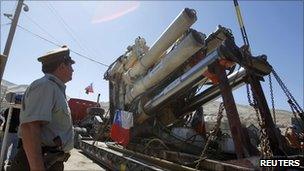The mental battle facing the trapped miners
- Published

Drilling of the escape tunnel could take until Christmas
The 33 Chilean miners trapped far underground have now been told that it could take months to get them out.
Knowing that a huge rescue effort is underway must offer a certain degree of comfort but how will the men come to terms with the fact they will not see daylight for weeks to come? And what mental resilience will they require?
Dr James Thompson, a senior psychology lecturer at University College London, said the news may not have come as a massive shock.
"The miners will have already had an understanding that there is a major task ahead.
"To have it confirmed will have been a bit of a blow but as specialists they will have known it would take time to get them out.
"Compared to the initial shock of the collapse of the mine, which must have been ghastly, this is a different ball game."
Depression
There have been reports that the men are being sent anti-depressants along with other medical supplies.
But Dr Thompson says he finds that idea a bit odd and actually the best way to help the men cope mentally is to give them practical tasks and to get a routine in place.
"What they need is food and supplies and then systems building up and then to be given tasks to keep them busy.
"Maybe send down some equipment to give them something to do and to keep them involved."
He says communication with the ground will be vital for keeping the men motivated and up -to-date but also once they have the ability to set up light they need to organise their time into day and night.
"The practical is also the psychological.
"In a disaster, if someone gives you a blanket, it's not just a blanket, it's an act of human caring.
"Ordinary first aid is an enormous psychological boost."
Extreme environment
NASA is being called upon to offer advice on how to best care for the miners in their state of isolation and confinement, their mental health is obviously being considered.
There are a lot of parallels with space missions, which can sometimes leave astronauts stranded for unexpectedly long periods of time, says Dr Kevin Fong from the Centre for Altitude, Space and Extreme Environment Medicine at University College London.
"This is as extreme as it gets and actually far more austere than for astronauts - I can't even begin to imagine it.
"They are isolated in a hazardous environment and the psychological stress will be quite impressive."
But he says, although they were unlikely to be prepared for spending such a long time trapped underground they are probably psychologically quite resilient.
"They are likely to be quite tough characters to be doing that job."